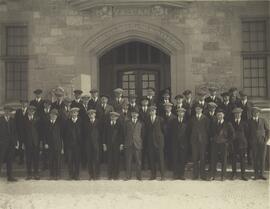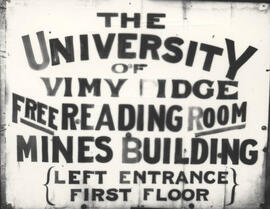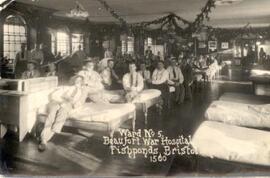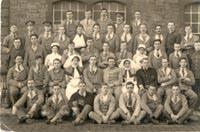William Allen pictured with other wounded soldiers and the hospital staff; outdoor scene.
Bio/Historical Note: William (Bill) Allen was born 9 May 1892 in Bristol, England. He emigrated to Canada with his family in 1911, setting up a homestead near Smiley, Saskatchewan. Allen joined the Army in 1916 and was wounded at the Somme, which resulted in the amputation of most of his left arm. After he was discharged in 1917, he enrolled in the College of Agriculture at the University of Saskatchewan. In 1922 Allen received his BSA and went on to do graduate work at Harvard and Cornell, where he earned a PhD in Agricultural Economics in 1925. He married Gwendolen Woodward in 1926. He returned to the U of S and established the Department of Farm Management, of which he was head until his resignation in 1938. During his time at the University, Allen directed a provincial soil survey in 1935 and was in charge of the first major debt survey of rural Saskatchewan in 1936. During World War II, Allen’s duties included keeping Britain supplied with Canadian food and to negotiate trade agreements covering the sale of Canada’s agricultural products to Britain. Allen was a passenger on the S.S. Nerissa when it was sunk by a torpedo off the west coast of Scotland on 30 April 1941. Allen was listed as missing and presumed dead. Allen is memorialized with a plaque in Convocation Hall and an annual award in the College of Agriculture.
Bio/Historical Note: Beaufort War Hospital was a military hospital in Stapleton district, now Greater Fishponds, of Bristol, England, during the First World War. Before the war, it was an asylum called the Bristol Lunatic Asylum, and after the war it became the psychiatric hospital called Glenside Hospital. By the time the first wounded soldiers arrived in late 1914, the asylum had undergone a major conversion. Like many hospitals across the country, it had been requisitioned by the War Office, which had demanded some 15,000 beds to be supplied nationally for war wounded.






